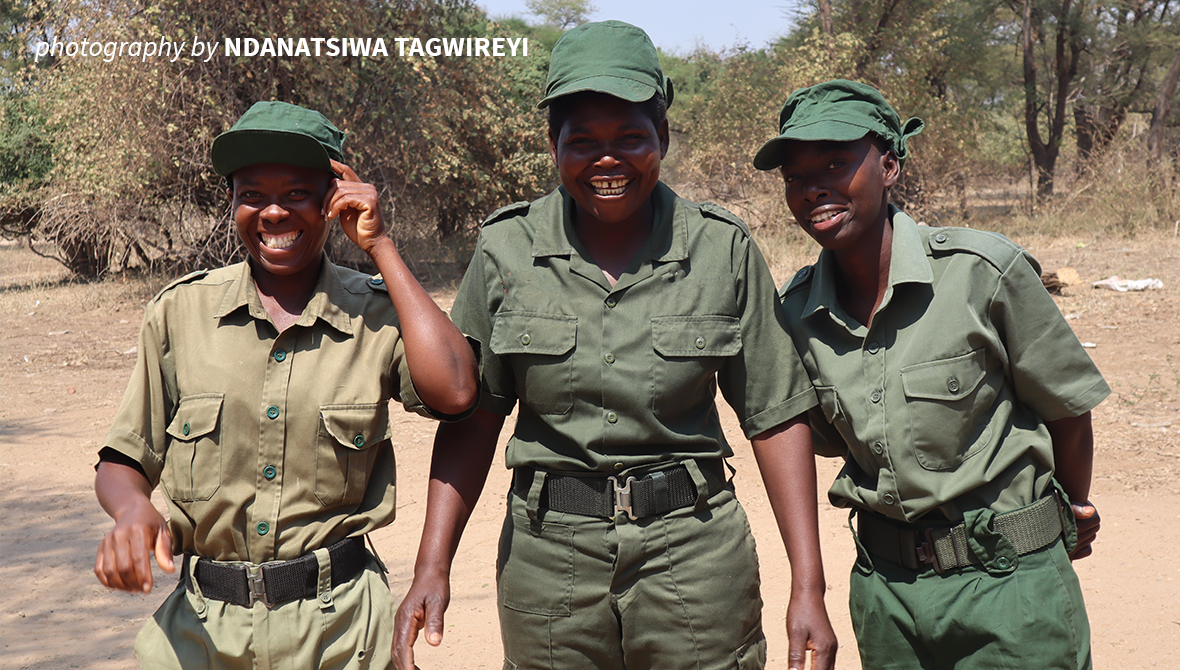Zimbabwe Female Wildlife Scouts: Climate Adaptation Alternative Livelihood Initiatives Testimonials

In the wake of the 2023 Africa Climate Summit, where global leaders converged to discuss climate solutions and strategies to achieve Paris Agreement goals, the vulnerabilities of women to climate change became a focal point. In the arid landscape of Mbire District, Northern Zimbabwe, female scouts have emerged as champions of change. Faced with erratic rainfall, extreme temperatures, and the looming threat of Human-Wildlife Conflict (HWC), these women have embraced innovative solutions, demonstrating remarkable resilience in adversity.
Mbire District, located 283 kilometers north of Harare, grapples with low rainfall and frequent HWC incidents. To gain insight into the adaptive strategies employed by the women in this region, interviews were conducted with four female scouts: Edith John, Brandina Matare, Mellisa Nyamasoka, and Emildah Marowa. Supported by the African Wildlife Foundation's (AWF) anti-poaching program, these women have diversified their income sources to mitigate the impact of climate change.
Embracing goat rearing as an alternative livelihood, these women have found solace in the resilience of goats, which thrive even in harsh climatic conditions. Brandina Matare, who initiated her goat-rearing project in 2023, highlights the ease of multiplication and the financial security these animals provide. With a focus on building secure kraals to protect her goats from wildlife, she exemplifies the knowledge gained through HWC mitigation training.
“Goats multiply easily, you can even sell them when you encounter a problem, when I do not have any other means of getting money, I rely on them as a store of value,” Matare says.
As a mother of seven, Matare believes that her children deserve a decent living and vowed to utilize alternative sources of income through the work of her hands. She is currently constructing a fishpond to start her fish farming project to diversify her streams of income away from farming.
Similarly, Edith John expanded her goat-rearing venture, ensuring a steady income for her family, and even ventured into other businesses, including vending and grain grinding. She bought her own car recently to help her move from one place to the next, doing her business. These initiatives provide financial stability and empower these women as entrepreneurs in their communities.
“I topped up with six goats to make them 9, I also bought 5 goats this time; I have left the five goats with other people with strong kraals while I am trying to build my own secure goat kraal” Edith comments.
Wildlife scouts Emildah Marowa and Mellisa Nyamasoka have ventured into soap making, showcasing creativity in the face of climate adversity. Marowa, in particular, has turned soap-making into a thriving business, connecting communities and bridging the gap between rural and urban areas. Her vision extends beyond soap, as she plans to diversify her products, including washing powder, baby products, cleaning liquid soaps, and perfumes. Through these endeavors, she supports her family and strengthens social connections within her community.
Marowa attests that she sometimes engages in barter trade with the soap to get grains like maize, groundnuts, and cowpeas.
“My project is going on well and it is a very profitable business, l started my project in June 2023, and it is an ongoing project that I am willing to improve. I sell my products at Harare market Square and the surrounding communities of Mbire,” Nyamasoka said.
These initiatives are not just about economic empowerment; they represent a profound connection between communities and their natural surroundings. By adapting to climate change through sustainable practices, these women are also contributing to biodiversity conservation. Their efforts echo the broader goals of the regional forums, such as the 2023 Africa Climate Summit, and global spaces, such as the upcoming UN Climate Change Conference of Parties (COP 28). The inclusion of such grassroots innovations is essential in the global climate dialogue, ensuring that the voices of those most affected by climate change are heard and respected.
In the face of climate adversity, the women of Mbire District stand as a testament to human resilience and ingenuity. Through their determination and creativity, they are not just adapting to change but also inspiring a community-driven movement towards a sustainable future. Their stories remind the world that solutions to climate challenges often emerge from the very communities directly impacted, emphasizing the importance of empowering, supporting, and learning from these local initiatives on the global stage.
At AWF, we applaud and are inspired by all the women making efforts to confront climate change challenges through entrepreneurial activities. We look forward to how best we can scale such initiatives through strategic partnerships.